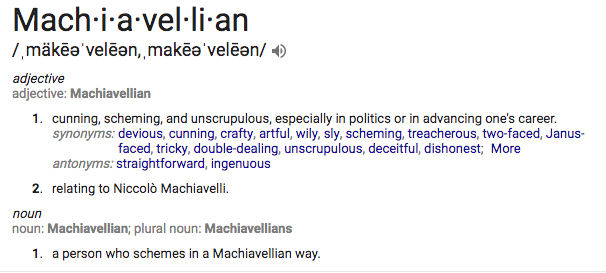I vote for more clinically precise terms. Sociopath, or anti-social personality disorder, or narcissist.
An individual diagnosed with antisocial personality disorder needs to meet all of the following criteria:
A pervasive pattern of disregard for and violation of the rights of others, occurring since age 15 years, as indicated by at least 3 of the following:
- Failure to conform to social norms with respect to lawful behaviors as indicated by repeatedly performing acts that are grounds for arrest.
- Deceitfulness, as indicated by repeated lying, use of aliases, or conning others for personal profit or pleasure.
- Impulsivity or failure to plan ahead.
- Irritability and aggressiveness, as indicated by repeated physical fights or assaults.
- Reckless disregard for safety of self or others.
- Consistent irresponsibility, as indicated by repeated failure to sustain consistent work behavior or honor financial obligations.
- Lack of remorse, as indicated by being indifferent to or rationalizing having hurt, mistreated, or stolen from another.
This enduring pattern of inner experience and behavior must deviate
markedly from the expectations of the individual's culture.
This enduring pattern is inflexible and pervasive across a broad
range of personal and social situations.
This enduring pattern leads to clinically significant impairment in
social, occupational, or other important areas of functioning.
The occurrence of antisocial behavior is not exclusively during the
course of schizophrenia or a manic episode.
An individual diagnosed with Narcissistic Personality Disorder needs to show at least 5 of the following criteria:
Has a grandiose sense of self-importance (e.g., exaggerates achievements and talents, expects to be recognized as superior without commensurate achievements).
Is preoccupied with fantasies of unlimited success, power, brilliance, beauty, or ideal love.
Believes that he or she is "special" and unique and can only be understood by, or should associate with, other special or high-status people (or institutions).
Requires excessive admiration.
Has a sense of entitlement, i.e., unreasonable expectations of especially favorable treatment or automatic compliance with his or her expectations.
Is interpersonally exploitative, i.e., takes advantage of others to achieve his or her own ends.
Lacks empathy: is unwilling to recognize or identify with the feelings and needs of others.
Is often envious of others or believes that others are envious of him or her.
Shows arrogant, haughty behaviors or attitudes.
This enduring pattern of inner experience and behavior must deviate markedly from the expectations of the individual's culture.
This enduring pattern is inflexible and pervasive across a broad range of personal and social situations.
This enduring pattern leads to clinically significant distress or impairment in social, occupational, or other important areas of functioning.
They could also have borderline personality disorder which has a characteristic of a lot of manipulation.

